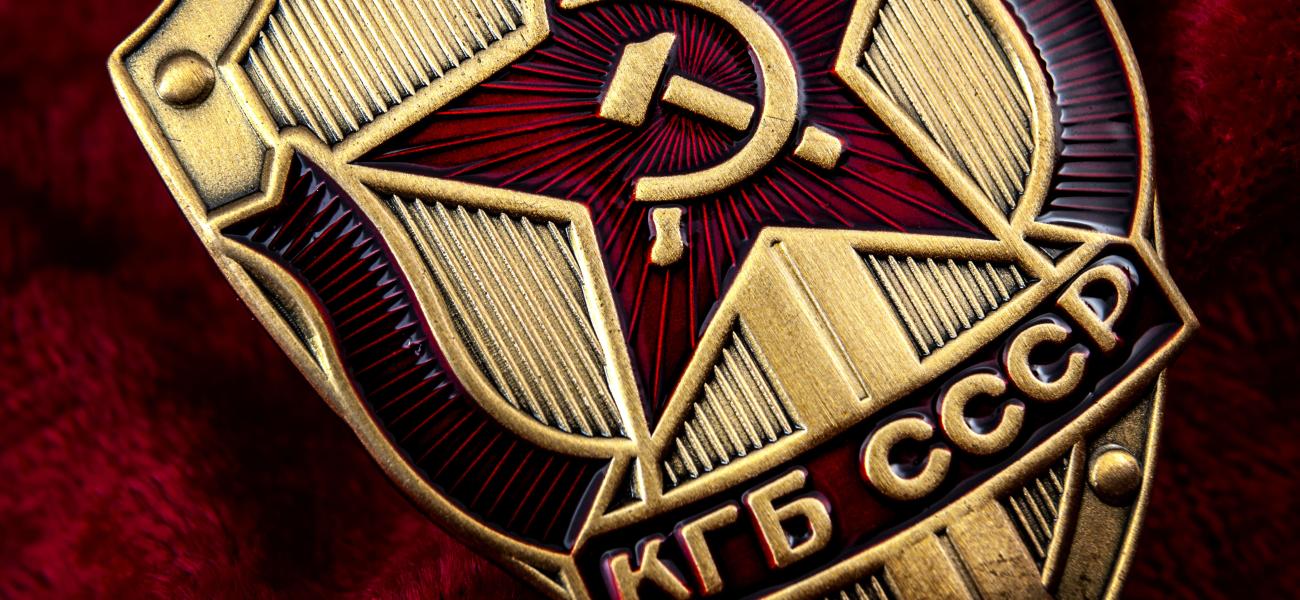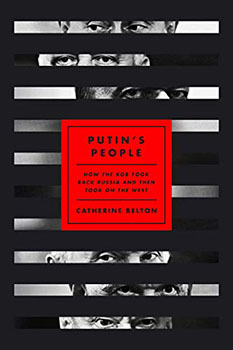
Belton: Russia’s Kleptocracy Is a Tool for Undermining the West
BOOK REVIEW
“Putin’s People: How the KGB Took Back Russia and Then Took on the West”
By Catherine Belton
Farrar, Straus and Giroux, June 2020
 Investigative journalist Catherine Belton set out to trace the takeover of the Russian economy by Vladimir Putin’s friends from the KGB, but as her reporting stretched through the years, she uncovered something more sinister.
Investigative journalist Catherine Belton set out to trace the takeover of the Russian economy by Vladimir Putin’s friends from the KGB, but as her reporting stretched through the years, she uncovered something more sinister.
In her insightful book, “Putin’s People: How the KGB Took Back Russia and Then Took on the West,” Belton argues the kleptocracy of the Putin era was not just about lining pockets: The billions of dollars at the disposal of Putin’s friends “were to be actively used to undermine and corrupt the institutions and democracies of the West.” Among these efforts, she details Russian backing of Donald Trump’s commercial interests back to the 1990s to try to exploit the developer’s vanity and financial vulnerability long before his rise to the presidency. Belton laments that the West, complacent after the end of the Cold War and eager for a share of Russia’s wealth, was slow to grasp the nature of the corruption and the depth of the country’s transformation as Putin established full control.
The Committee for State Security may have vanished along with the Soviet Union, but its operatives lived on. By exploring their reach and following the money, Belton provides a framework for understanding the rise of Putin, the evolution of his regime and what she calls the reactivation of the KGB playbook to sow division and discord in the West. But it is the details unearthed by her interviews with an extensive collection of insiders that make her arguments so convincing and the book such a gripping read.
Belton sheds new light on Putin from the first chapter. No longer should anyone believe his portrayal of Dresden as a Cold War backwater and the five years he spent there in the 1980s as having little consequence. Her research, including interviews with a former high-ranking Stasi officer and a West German security consultant who later worked with Putin, shows the East German city as the gateway for smuggled Western technology and links Putin to the recruitment of the scientists and businessmen who could provide access to the embargoed high-tech goods. Dresden was also a meeting place at the time for the Red Army Faction, which carried out acts of terror in West Germany in the 1970s and ‘80s. A former RAF member alleged in an interview with the author that Putin was instrumental in supporting this far-left urban guerrilla group. Belton acknowledges that Putin’s involvement is near impossible to verify and writes that her attempts to do so with KGB and Stasi veterans caused alarm. The Kremlin has not commented on the allegation.
“Putin’s People” covers some of the same ground as Karen Dawisha’s 2014 book, “Putin’s Kleptocracy: Who Owns Russia?” Dawisha, an American political science professor who died in 2018, detailed the corruption that made Putin and his cohorts rich, but her research by her own account relied heavily on the work of Russian and Western investigative journalists. In contrast, Belton, who spent 16 years as a journalist in Russia and dedicated seven years to this book, interviewed and re-interviewed innumerable key figures and their associates from the worlds of intelligence, organized crime, business and politics. Belton’s book also benefits from the passage of time and all that has occurred since Dawisha’s book was published.
One of the insiders she interviewed extensively was Felipe Turover, a former senior KGB officer. Turover told her the story for the first time of how he helped Putin set up the oil-for-food scheme in St. Petersburg in the early 1990s, essentially admitting that the intention from the start was to create a hard-currency slush fund for the city. Belton also interviewed once-close Putin confidant Vladimir Yakunin. The former chief of Russian railways told her how he and other KGB-connected businessmen took over Bank Rossiya just before the Soviet Union’s collapse. It became, in the words of the U.S. government, the “personal bank” for Putin and other senior Russian officials. Sergei Pugachev, once known as the Kremlin’s banker, and Valentin Yumashev, chief of staff to President Boris Yeltsin, drew back the curtain on the maneuvering that made Putin president in 2000.
Belton spoke to an extraordinary number of people as the research took her from Russia to Britain, France, Germany, Spain, Switzerland and the U.S. If her book falls short, it is for leaving the reader wishing for more. Many chapters read like they could be books of their own.
Starting with Dresden in the late 1980s, Belton tracks the KGB’s use of organized crime and “friendly firms” to move money to the West. It was a system first aimed at preserving KGB networks as the Soviet Union crumbled. After Putin became president, it would turn his associates into billionaires.
Over the same decades, beginning in 1990, she traces the efforts of what became a network of Russian intelligence operatives, tycoons and organized crime associates to ingratiate themselves with an indebted Trump and use him to funnel money into the United States. With U.S. banks cracking down on money laundering, they put their cash into real estate and paid Trump handsomely for the privilege of using his name. Belton interviewed Felix Sater, who described his work with Russian military intelligence and bragged about his long friendship with a powerful Russian mobster. Sater first met Trump in 2001 and became a business partner through Bayrock Group, which set up offices in Trump Tower. Belton acknowledges that it is impossible to know how much Bayrock paid Trump for a series of luxury developments. The political opportunity Trump presented to Russia came much later. As he began his bid for the presidency, “the same Russian network stepped up its courtship of him,” Belton writes.
Belton argues the West misread Russian corruption, such as the money laundering revealed by the case against the Bank of New York and the release of the Panama Papers. The money was seen only as stolen cash, not as a vast slush fund to be used to buy influence and threaten the West.
In her unveiling of Putin’s regime, Belton often takes the West to task. She points to Western complicity in the Kremlin takeover of Mikhail Khodorkovsky’s oil company, Yukos, through the participation of Western law firms, oil majors and banks. She says this allowed Putin to conclude that “ultimately, financial interests would outweigh concerns about his regime’s abuse of the law and democracy.” Belton covered the takedown of Khodorkovsky, once Russia’s richest man, first at The Moscow Times when I was the newspaper’s editor and later at the Financial Times. From his arrest in 2003 through his conviction two years later and sudden release in late 2013, her reporting was authoritative. “The trial,” as she states in the book, “to put it mildly, changed everything.”
It opened the way for Putin’s KGB men to seize control of the commanding heights of Russia’s economy, and it helped turn Russian law enforcement into a “predatory machine that took over businesses and removed political rivals.” As Putin loyalists took over whole sectors of the Russian economy, forming what became known as Kremlin, Inc., Belton argues that the West still failed to grasp the depth of the transformation. Many held out hopes that the rising middle class would lead to a demand for more political rights, that the survival of some of the Yeltsin-era oligarchs meant some businesses remained independent, that Russian companies lining up to list their shares on Western stock exchanges signaled a desire to play by Western rules.
Instead, the world saw Putin move aggressively to shore up his power and restore Russia’s geopolitical might. When many in Moscow’s new middle class rose up in protest as he prepared to reclaim the presidency in 2012, he violently shut them down. When two years later the stalling economy began to eat into his ratings, Putin sent troops to seize Crimea and invade eastern Ukraine. After the U.S. imposed punishing sanctions, Moscow saw the 2016 election campaign as fair game.
By that time, some in the Obama administration had become increasingly alarmed about Russia’s capabilities, Belton writes, pointing to Vice President Joe Biden as one of the most vocal. She quotes him warning of the Kremlin’s ability to direct loyal oligarchs to carry out strategic operations and its use of corruption to undermine democratic governments.
Now, as Biden prepares to challenge Trump in November and the country once again faces the prospect of Russian election interference, Belton’s book serves as a warning against underestimating Putin and his people. “Putin’s People” also shows us what is at stake for Putin as he maneuvers to change the Russian constitution to remain at the top of the system he created when his fourth term ends in 2024.
Lynn Berry
Lynn Berry was editor-in-chief of The Moscow Times from 2001 to 2006, and news editor of the Moscow bureau of The Associated Press from 2007 to 2016.
iStock photo by Getty Images.
The opinions expressed in this article are solely those of the author.
